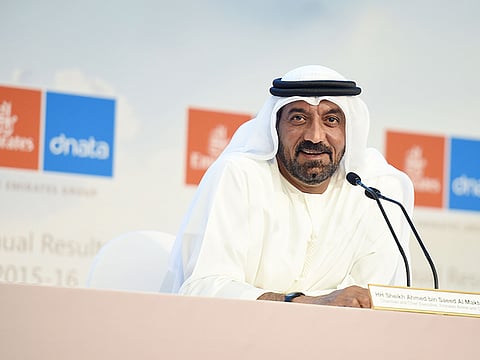Emirates looks at new economy class as load factor drops
World’s largest international airline reported its largest ever profit on Tuesday

Dubai: Emirates is looking at introducing premium economy, President Tim Clark said on Tuesday after the airline reported a 56 per cent increase in profit but a drop in the number of seats filled.
The airline made Dh7.1 billion in the 12 months to March 31, compared to Dh4.6 billion the year earlier, as it carried more passengers and benefited from falling oil prices.
Emirates could now add premium economy to its fleet after load factor — a gauge of the number of seats filled — slipped 3.1 percentage points to 76.5 per cent despite carrying 51.9 million passengers, 8 per cent more than the year prior.
“We’re looking at all sorts of opportunities in terms of product development,” Clark told reporters at Emirates headquarters in Dubai. “Clearly, there is a business case for looking seriously at premium economy. That’s not to say we’re going to do it but we’re looking at it.”
Emirates would be the first major Gulf airline to introduce premium economy, a class between economy and business. Its airline partner Qantas offers premium economy on its daily Airbus A380 services linking Dubai with Australia and London.
Strong dollar woes
The dollar, which rose by as much as 6 per cent during the financial year, cost the airline Dh6 billion in revenue and had a Dh4.2 billion impact on its “bottom line,” Chairman and Chief Executive Shaikh Ahmad Bin Saeed Al Maktoum said.
“The strong dollar against major currencies will continue to be a challenge,” Shaikh Ahmad said. “We expect that the low oil prices will continue to be a double-edged sword, good for our operating costs but bad for the global business and consumer confidence.”
“Our industry has always been competitive putting pressure on yield and we just have to stay ahead of the competition that’s why we are investing so much of our profit back in the business.”
Aircraft order
Emirates could add more current model A380s to its existing order of 142 even if Airbus decides not to go ahead with a new engine model of the super jumbo known as a “neo,” Clark said.
“As the first batch comes up for retirement we will want to replace them with more A380s,” he said. “Whether that’s enough to persuade Airbus to keep the line going is up to them really. They have got to sell more.”
Emirates, the biggest A380 operator with 77 in its fleet and a further 65 on order, has been pushing Airbus to commit to building the A380neo. Clark said Emirates could need as many as 200 A380s, current model or neo, once it moves over to Dubai’s newest airport Al Maktoum International at Dubai World Central in the mid-2020s.
Emirates is also mulling an order for around 70 A350s or the same number of Boeing 787s after cancelling a A350 order in 2014.
Shaikh Ahmad said, “The interest is there” but declined to say when the airline could make a decision on the order.
“All we have to do is decide what is best for our fleet, our network, size and fit and which of those aircraft are best for what we do,” Clark later told reporters.
Subsidy row
Emirates is planning to increase capacity and add more routes in the United States as a row with American carriers over subsidy allegations fizzles out.
“We are looking at many US destinations ... we’ve got ten at the moment. We’ve said we needed 20,” Clark said without naming any new destinations.
Emirates has added capacity on US routes and started services to Orlando, Florida last year amid lobbying by US’ largest airline for the US government to block their expansion into the country. Clark, who has denied the subsidy allegations, suggested that row is now over.
“I don’t think really it succeeded has it and as the US administration comes to the back end of its days I wonder whether its got the appetite to take it on at this stage.”
Shaikh Mohammad says both Emirates and Dnata have become global players
Staff Report
Dubai: Emirates Group is a corporation that represents the UAE’s spirit of growth, innovation and resilience, according to His Highness Shaikh Mohammad Bin Rashid Al Maktoum, Vice-President and Prime Minister of the UAE and Ruler of Dubai.
Shaikh Mohammad said in a statement from Emirates on Tuesday that both Emirates and Dnata have become global players, adding that he expects them to continue to thrive.
“Against all odds, fierce competition, and numerous challenges, the Emirates Group has built a successful enterprise. This has been achieved by continuously innovating in every aspect of its operations. They have taken their strong core business model and built on it by adding new capabilities and taking advantage of new technologies,” Shaikh Mohammad stated.
The UAE’s aim is not only to maintain its success, but also to move into a new phase of development where it will play a bigger role in the global economy, he said.
Sign up for the Daily Briefing
Get the latest news and updates straight to your inbox



